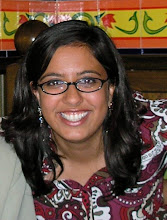The other day I was wandering through the house trying to find something to do when I happened upon a book entitled “The Diary of Ma Yan.” This touching translation of a thirteen-year-old girl’s daily struggle to balance her studies with life in one of China’s poorest villages was a jarring reminder of just how differently the rest of the world lives. According to the UN Development Program’s 2006 annual Global partnership for development report, “The poorest 40 percent of the world’s population – the 2.5 billion people who live on less than $2 a day – account for five percent of global income, while the richest 10 percent account for 54 percent.” Can you imagine that? More than half of the world’s income goes to just 600 million people. Now, I’m not about to go on a tirade against capitalism or anything like that, but carving out your niche in this world shouldn’t happen at the expense of leaving others so far behind.
I’m not sure whether my family falls under that 10 percent bracket but I do know my life is far more comfortable than that of many others around the world. My biggest worries usually revolve around catching up with assigned reading before an exam and figuring out what my weekend plans are. And while my education is certainly important to me, I’ve never really questioned its presence. It’s always been a given that I would work hard in school, go to college, move on to graduate school and then land a rewarding, high-paying job. While I haven’t necessarily reached that dream job pinnacle just yet, life without education has been a non-sequitur. It’s not that I don’t work hard – my 4.0 is a testament to that – but I’ve never realized just how lucky I am to be able to devote myself fully to school. I don’t have the burden of helping to sustain a family; I’ve got no crops to harvest or drinking water to collect; I’m not even responsible for financing my own education (thank God for parents).
While reading the book I was most struck by the fact that in almost every entry Ma Yan reminded herself how important her education was and chided herself for not trying harder. Schooling wasn’t just the key to broadening her own future; more importantly education would enable her to one day give her parents and hopefully grandparents the comfortable lives they so deserved. And the fact that she wrote these words in her personal diary, not in a self-help manual intended to be read by millions of eyes, makes it so much more profound.
Reading her diary, I felt ashamed that all I do is complain about school. I whine about how much work there is to do, rail on about how I hate some class, procrastinate until the wee hours of the morning and proceed to repeat how tired I am the next day. I realized I should just suck it up and deal with it because so many young people out there would do anything to have the opportunities I have.
And I know I’m not the only one. Too many of us forget how lucky we are to have what we do. We forget to thank our parents for everything they do for us and be grateful for the fact that our daily problems involve negotiating traffic and deciding what to make for dinner. I couldn’t imagine living in a place where I had to walk twelve miles through rocky hillsides to get to school or where my mom had to grit her teeth and pick fa cai while suffering from a stomach ulcer.
Halfway through the book I stopped and looked at the dates of the entries, trying to remember what I was doing when she wrote these vignettes. With a jolt I realized that Ma Yan and I are the same age. While I was in middle school, freely enjoying my passing childhood, she was writing these words, words that began as an explanation of her days but eventually became a poignant look at impoverished yet determined youth. I admire her so much, willing to give her private diaries to a stranger in the hopes that he share them with the rest of the world. I was happy to read that the stranger, French journalist Pierre Haski, not only shared them but helped start the Association for the Children of Ningxia to help others pay for their education. It’s thanks to people like Ma Yan and her courage and perseverance that my generation will not only help address many of the world’s most pressing issues, but will welcome the challenge to do so. I wish her the best of luck in all of her future endeavors; I’m sure this won’t be the last we’re hearing of Ma Yan, not by a longshot.
Tuesday, May 22, 2007
Subscribe to:
Post Comments (Atom)





No comments:
Post a Comment